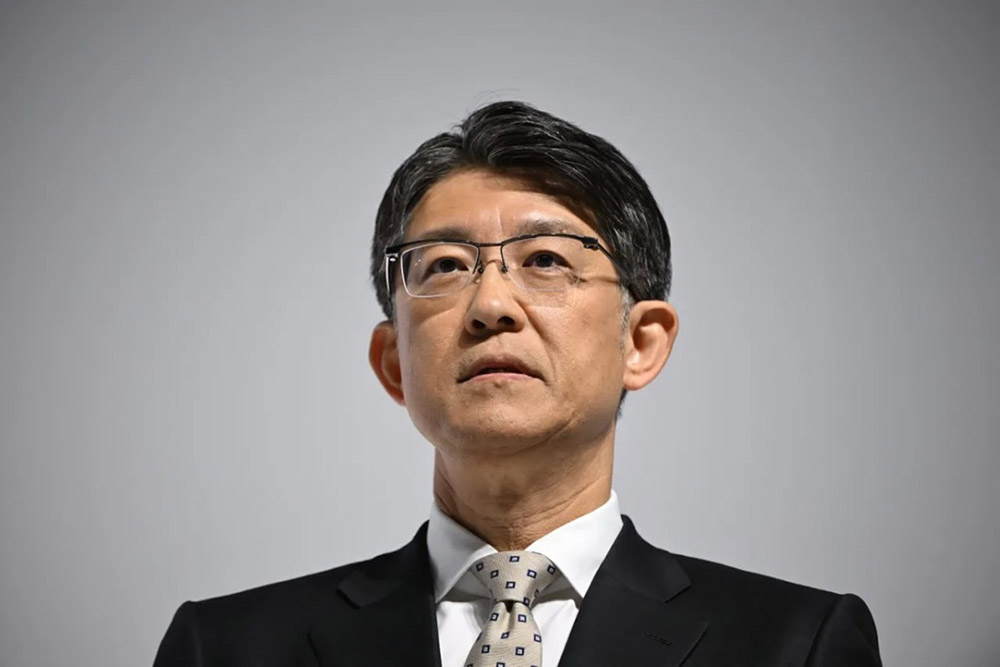
日本汽車業(yè)巨頭豐田汽車公司上周四預測,,受唐納德·特朗普推行的汽車關稅等因素沖擊,本財年凈利潤將同比下降35%,。
汽車制造商堪稱美國總統(tǒng)對自由貿易展開多維度打壓行動中受沖擊最嚴重的行業(yè)之一,。
特朗普政府上周六宣布,在對進口成品汽車加征25%關稅的基礎上,,對包括發(fā)動機和變速箱在內的汽車零部件也加征同等稅率的關稅,。
針對始于4月的2025—2026財年,豐田汽車公司當前預計凈利潤達3.1萬億日元(約合216億美元),。
這家全球銷量最高的汽車制造商在一份聲明中表示:“已初步考量2025年4月與5月美國關稅的預期影響,。”
在截至3月31日的12個月里,,該公司錄得凈利潤近4.8萬億日元,,同比下降3.6%,但高于2月份發(fā)布的4.5萬億日元預期,。
截至本月,,據(jù)估計,關稅將使2025至2026年營業(yè)利潤減少約1800億日元,。
當被問及關稅帶來的長期影響時,,豐田汽車公司總裁兼首席執(zhí)行官佐藤浩二(Koji Sato)對記者表示,“目前難以預測”,。
他說:“美國正與各國政府就關稅細則展開磋商,,具體細節(jié)仍存變數(shù)?!?
佐藤浩二表示,,豐田汽車公司每年從日本向美國出口50萬輛汽車。
“因此在短期內,,我們正調整出貨量……而從中長期來看,,我們將致力于本土產(chǎn)品開發(fā),以契合當?shù)乜蛻粜枨?。?/p>
但他表示,,從保護供應鏈以及通過出口賺取外匯的角度來看,,該公司的目標是維持日本國內每年300萬輛汽車的產(chǎn)量,。
“基準”預測
財報公布后,豐田汽車公司股價下跌了1.3%,。
彭博行業(yè)研究汽車分析師吉田龍夫(Tatsuo Yoshida)對法新社表示,,這家汽車制造商的“影響力和地位”意味著其盈利預測在日本備受關注。
在上周四財報公布前,,他表示:“若豐田未能就關稅影響給出某種基準,,包括供應商在內的整個國家都將陷入迷茫?!?/p>
去年,,汽車出口約占日本對美出口的28%。
特朗普上月底簽署了一項行政命令,,限制重疊征稅對企業(yè)的沖擊,,從而對汽車制造商關稅條款構成緩沖。
總統(tǒng)還發(fā)布了一項公告,,給予汽車行業(yè)兩年緩沖期,,以便實現(xiàn)供應鏈回流美國本土。
2024年,,豐田汽車公司在全球銷售了1080萬輛汽車,,穩(wěn)居全球汽車制造商銷量榜首之位。
汽車行業(yè)咨詢公司日本中西研究所(Nakanishi Research Institute)的中西孝樹(Takaki Nakanishi)告訴法新社:“汽車制造商正盡其所能將產(chǎn)能向美國本土遷移,,不過(短期內)不會有顯著變化,,因為產(chǎn)能轉移需要時間?!?/p>
上個月,,特朗普抨擊了日對美汽車出口與美對日汽車出口之間存在顯著逆差。
豐田汽車公司是美國銷量第二大的汽車制造商,,去年在美國售出超230萬輛汽車,,而美國汽車行業(yè)領軍企業(yè)通用汽車公司(General Motors)在日本僅售出587輛雪佛蘭和449輛凱迪拉克。
專家表示,,日本道路狹窄(許多美國車型無法通行),,加之日本汽車在品質和燃油效率方面久負盛譽,是造成這種情況的部分原因,。
“他們不購買我們的車,,但我們卻購買了他們數(shù)百萬輛車!”特朗普在4月表示,,指責日本“在貿易方面對盟友極不友好”,。(財富中文網(wǎng))
譯者:中慧言-王芳
日本汽車業(yè)巨頭豐田汽車公司上周四預測,受唐納德·特朗普推行的汽車關稅等因素沖擊,,本財年凈利潤將同比下降35%,。
汽車制造商堪稱美國總統(tǒng)對自由貿易展開多維度打壓行動中受沖擊最嚴重的行業(yè)之一,。
特朗普政府上周六宣布,在對進口成品汽車加征25%關稅的基礎上,,對包括發(fā)動機和變速箱在內的汽車零部件也加征同等稅率的關稅,。
針對始于4月的2025—2026財年,豐田汽車公司當前預計凈利潤達3.1萬億日元(約合216億美元),。
這家全球銷量最高的汽車制造商在一份聲明中表示:“已初步考量2025年4月與5月美國關稅的預期影響,。”
在截至3月31日的12個月里,,該公司錄得凈利潤近4.8萬億日元,,同比下降3.6%,但高于2月份發(fā)布的4.5萬億日元預期,。
截至本月,,據(jù)估計,關稅將使2025至2026年營業(yè)利潤減少約1800億日元,。
當被問及關稅帶來的長期影響時,,豐田汽車公司總裁兼首席執(zhí)行官佐藤浩二(Koji Sato)對記者表示,“目前難以預測”,。
他說:“美國正與各國政府就關稅細則展開磋商,,具體細節(jié)仍存變數(shù)?!?
佐藤浩二表示,,豐田汽車公司每年從日本向美國出口50萬輛汽車。
“因此在短期內,,我們正調整出貨量……而從中長期來看,,我們將致力于本土產(chǎn)品開發(fā),以契合當?shù)乜蛻粜枨??!?/p>
但他表示,從保護供應鏈以及通過出口賺取外匯的角度來看,,該公司的目標是維持日本國內每年300萬輛汽車的產(chǎn)量,。
“基準”預測
財報公布后,豐田汽車公司股價下跌了1.3%,。
彭博行業(yè)研究汽車分析師吉田龍夫(Tatsuo Yoshida)對法新社表示,,這家汽車制造商的“影響力和地位”意味著其盈利預測在日本備受關注。
在上周四財報公布前,,他表示:“若豐田未能就關稅影響給出某種基準,,包括供應商在內的整個國家都將陷入迷茫。”
去年,,汽車出口約占日本對美出口的28%,。
特朗普上月底簽署了一項行政命令,限制重疊征稅對企業(yè)的沖擊,,從而對汽車制造商關稅條款構成緩沖。
總統(tǒng)還發(fā)布了一項公告,,給予汽車行業(yè)兩年緩沖期,,以便實現(xiàn)供應鏈回流美國本土。
2024年,,豐田汽車公司在全球銷售了1080萬輛汽車,,穩(wěn)居全球汽車制造商銷量榜首之位。
汽車行業(yè)咨詢公司日本中西研究所(Nakanishi Research Institute)的中西孝樹(Takaki Nakanishi)告訴法新社:“汽車制造商正盡其所能將產(chǎn)能向美國本土遷移,,不過(短期內)不會有顯著變化,,因為產(chǎn)能轉移需要時間?!?/p>
上個月,,特朗普抨擊了日對美汽車出口與美對日汽車出口之間存在顯著逆差。
豐田汽車公司是美國銷量第二大的汽車制造商,,去年在美國售出超230萬輛汽車,,而美國汽車行業(yè)領軍企業(yè)通用汽車公司(General Motors)在日本僅售出587輛雪佛蘭和449輛凱迪拉克。
專家表示,,日本道路狹窄(許多美國車型無法通行),,加之日本汽車在品質和燃油效率方面久負盛譽,是造成這種情況的部分原因,。
“他們不購買我們的車,,但我們卻購買了他們數(shù)百萬輛車!”特朗普在4月表示,,指責日本“在貿易方面對盟友極不友好”,。(財富中文網(wǎng))
譯者:中慧言-王芳
Japanese auto giant Toyota forecast on Thursday a 35% year-on-year drop in net profit for the current financial year, citing Donald Trump’s vehicle tariffs among other factors.
Carmakers have been among the hardest hit by the U.S. president’s multi-pronged assault on free trade.
On top of a 25% tariff already placed on finished imported cars, the Trump administration on Saturday imposed a similar duty on auto parts including engines and transmissions.
For the 2025-26 financial year that began in April, Toyota now forecasts net profit of 3.1 trillion yen ($21.6 billion).
“The estimated impact of U.S. tariffs in April and May 2025 have been tentatively factored in,” the world’s top-selling automaker said in a statement.
The company logged net profit of nearly 4.8 trillion yen in the 12 months to March 31, down 3.6% year-on-year but beating its forecast issued in February of 4.5 trillion yen.
As of this month, it estimated the tariffs would impact 2025-2026 operating profit to the tune of 180 billion yen.
Asked about the more long-term impact of the tariffs, Toyota’s president and CEO Koji Sato told reporters the situation was “difficult to predict right now”.
“U.S. tariffs are currently being negotiated between governments, and details are still fluid,” he said.
Toyota exports 500,000 vehicles annually to the United States from Japan, Sato said.
“So in the short-term we are adjusting shipments… while mid- to long-term, we will pursue the local development of products that suit local customers.”
But the company will aim to maintain its production in Japan of three million vehicles annually, he said, “from the viewpoint of protecting supply chains and earning foreign currencies by exporting”.
‘Benchmark’ forecast
Toyota shares were trading down 1.3% after the earnings announcement.
The automaker’s “influence and position” mean its profit forecasts are being closely watched in Japan, Bloomberg Intelligence auto analyst Tatsuo Yoshida told AFP.
“The whole country including suppliers would be left at a loss if Toyota doesn’t issue some kind of benchmark” on the impact of the tariffs, he said ahead of Thursday’s results.
Automobiles accounted for around 28% of Japanese exports to the United States last year.
Trump moved to soften the details of his tariffs on automakers late last month—signing an executive order to limit the impact of overlapping levies on firms.
The president also released a proclamation that gives the industry a two-year grace period to move supply chains back to the United States.
Toyota sold 10.8 million vehicles worldwide in 2024, holding onto its crown as the world’s top-selling automaker.
“Automakers are doing what they can in trying to shift production to the United States, even though there are no huge changes (right away) as shifting production takes time,” Takaki Nakanishi of auto sector consulting firm Nakanishi Research Institute told AFP.
Trump last month hit out at the wide difference between Japanese car exports to the United States and those going the other way.
Toyota is the second-top-selling automaker in the United States, where it shifted more than 2.3 million vehicles last year, while U.S. industry leader General Motors sold just 587 Chevrolets and 449 Cadillacs in Japan.
Experts say Japan’s narrow roads—too narrow for many U.S. models—and Japanese cars’ reputation for quality and fuel efficiency are some reasons for this.
“They don’t take our cars, but we take MILLIONS of theirs!” Trump said in April, accusing Japan of treating its ally “very poorly on trade”.






